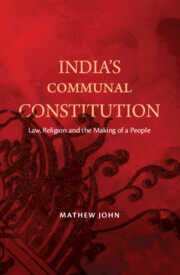4 - Sacralising Caste
The Hindu Resolution of Equal Citizenship
Published online by Cambridge University Press: 05 August 2023
Summary
As observed in the previous chapter, the reorganisation of minority rights in independent India was the result of a new constitutional imagination justified as the transformation of Indian society. Reorganising the colonial government of ‘minorities’, the project of social transformation unfolded a forked path to recognise and incorporate minorities and Scheduled Castes into the Constitution of independent India. Both these newly recognised constitutional groups were envisaged as axes of identity facilitating a project for the social transformation of the Indian people understood as a liberal and secular community of free and equal citizens. However, as argued in the last chapter, despite the best laid intentions of the Constitution-makers, constitutional design and practice operated to reinforce and entrench communally ordered religious identities that demarcated the Indian people into majorities and minorities.
This chapter will show that the design and defence of the rights of the Scheduled Castes also suffer a similar problem. That is, caste injustice is constitutionally framed and resolved as a Hindu problem. Besides flying in the face of the fact that caste injustice in India is not restricted to any one communal group, the ‘Hindu’ resolution of caste also nationalises and entrenches caste in explicitly communal terms. This communal resolution of the problem of the Scheduled Castes has had ripple effects on related constitutional debates as well, especially on the rights of social groups the Constitution terms the ‘Backward Classes’. Accordingly, elaborating the constitutional scheme pertaining to Scheduled Castes and the Backward Classes, this chapter spotlights the manner in which their rights are secured against the background of a communal and Hindu representation of the Indian people.
The Background
The Scheduled Castes, or the Depressed Classes as they were known in the colonial state, were drawn into Indian constitutional imagination as minorities. Their inclusion in colonial legislatures as minorities was intended to represent the voice of social groups suffering from systemic forms of discrimination on account of caste society, most notably through the practice of untouchability. These social groups first found representation in colonial legislatures following the Government of India Act of 1919. However, unlike other important minorities such as the Muslims and the Sikhs, Depressed Class representatives were not drawn into colonial legislatures through separate or reserved electorates but by way of state nomination.
- Type
- Chapter
- Information
- India's Communal ConstitutionLaw, Religion, and the Making of a People, pp. 98 - 122Publisher: Cambridge University PressPrint publication year: 2024



